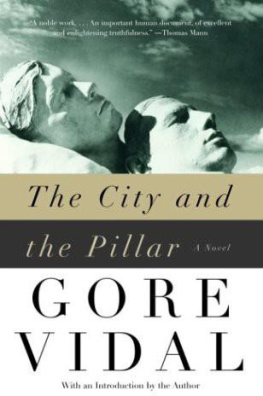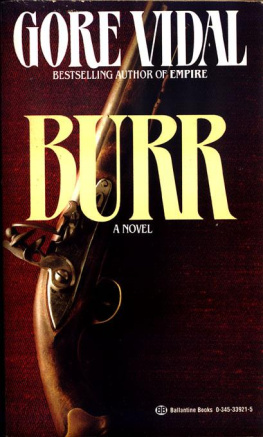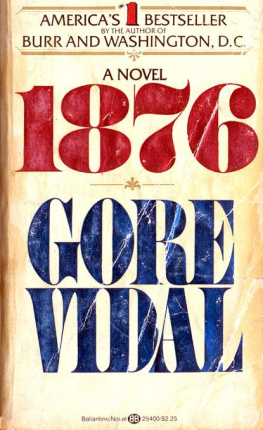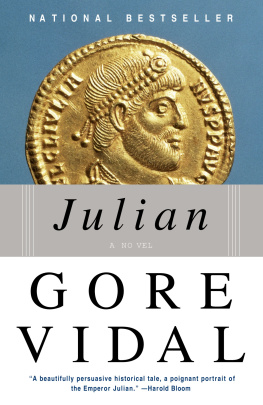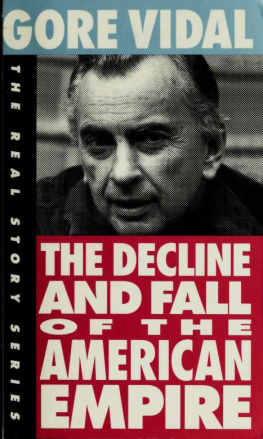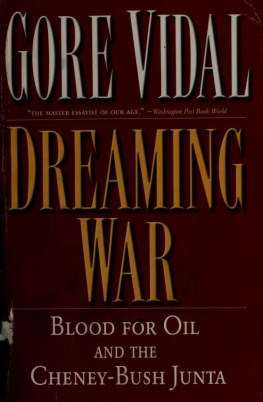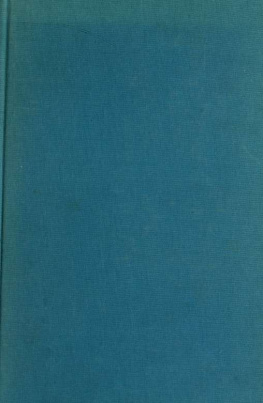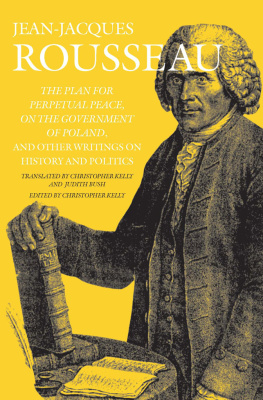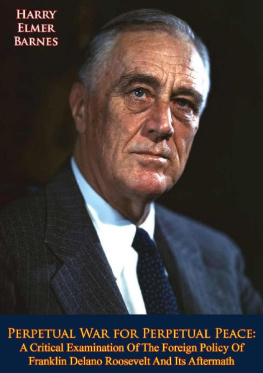Gore Vidal - Perpetual War for Perpetual Peace: How We Got to Be So Hated
Here you can read online Gore Vidal - Perpetual War for Perpetual Peace: How We Got to Be So Hated full text of the book (entire story) in english for free. Download pdf and epub, get meaning, cover and reviews about this ebook. genre: Politics. Description of the work, (preface) as well as reviews are available. Best literature library LitArk.com created for fans of good reading and offers a wide selection of genres:
Romance novel
Science fiction
Adventure
Detective
Science
History
Home and family
Prose
Art
Politics
Computer
Non-fiction
Religion
Business
Children
Humor
Choose a favorite category and find really read worthwhile books. Enjoy immersion in the world of imagination, feel the emotions of the characters or learn something new for yourself, make an fascinating discovery.

- Book:Perpetual War for Perpetual Peace: How We Got to Be So Hated
- Author:
- Genre:
- Rating:5 / 5
- Favourites:Add to favourites
- Your mark:
- 100
- 1
- 2
- 3
- 4
- 5
Perpetual War for Perpetual Peace: How We Got to Be So Hated: summary, description and annotation
We offer to read an annotation, description, summary or preface (depends on what the author of the book "Perpetual War for Perpetual Peace: How We Got to Be So Hated" wrote himself). If you haven't found the necessary information about the book — write in the comments, we will try to find it.
Perpetual War for Perpetual Peace: How We Got to Be So Hated — read online for free the complete book (whole text) full work
Below is the text of the book, divided by pages. System saving the place of the last page read, allows you to conveniently read the book "Perpetual War for Perpetual Peace: How We Got to Be So Hated" online for free, without having to search again every time where you left off. Put a bookmark, and you can go to the page where you finished reading at any time.
Font size:
Interval:
Bookmark:
It is a law of physics (still on the books when last I looked) that in nature there is no action without reaction. The same appears to be true in human naturethat is, history. In the last six years, two dates are apt to be remembered for longer than usual in the United States of Amnesia: April 19, 1995, when a much-decorated infantry soldier called Timothy McVeigh blew up a federal building in Oklahoma City, killing 168 innocent men, women, and children. Why? McVeigh told us at eloquent length, but our rulers and their media preferred to depict him as a sadistic, crazed monsternot a good person like the rest of uswho had done it just for kicks. On September 11, 2001, Osama bin Laden and his Islamic terrorist organization struck at Manhattan and the Pentagon. The Pentagon Junta in charge of our affairs programmed their president to tell us that bin Laden was an "evildoer" who envied us our goodness and wealth and freedom.
None of these explanations made much sense, but our rulers for more than half a century have made sure that we are never to be told the truth about anything that our government has done to other people, not to mention, in McVeigh's case, our own. All we are left with are blurred covers of Time and Newsweek where monstrous figures from Hieronymus Bosch stare out at us, hellfire in their eyes, while the New York Times and its chorus of imitators spin complicated stories about mad Osama and cowardly McVeigh, thus convincing most Americans that only a couple of freaks would ever dare strike at a nation that sees itself as close to perfection as any human society can come. That our ruling junta might have seriously provoked McVeigh (a heartland American hero of the Gulf War) and Osama, a would-be Muslim Defender of the Faith, was never dealt with.
Things just happen out there in the American media, and we consumers don't need to be told the why of anything. Certainly those of us who are in the why-business have a difficult time getting through the corporate-sponsored American media, as I discovered when I tried to explain McVeigh in Vanity Fair , or when, since September 11, my attempts to get published have met with failure.
Another silenced September voice was that of Arno J. Mayer, professor emeritus of history at Princeton, whose piece entitled "Untimely Reflections" was turned down everywhere in the United States, including by The Nation , where I have been a contributing editor for many years (and where my untimely reflections on September 11 were also turned down). Mayer published his piece in the French newspaper Le Monde . He wrote, in part:
Until now, in modern times, acts of individual terror have been the weapon of the weak and the poor, while acts of state and economic terror have been the weapons of the strong. In both types of terror it is, of course, important to distinguish between target and victim. This distinction is crystal clear in the fatal hit on the World Trade Center: the target is a prominent symbol and hub of globalizing corporate financial and economic power; the victim the hapless and partly subaltern workforce. Such distinction does not apply to the strike on the Pentagon: it houses the supreme military commandthe ultima ratio regnum of capitalist globalization even if it entails, in the Pentagon's own language, "collateral" damage to human life.
In any case, since 1947 America has been the chief and pioneering perpetrator of "preemptive" state terror, exclusively in the Third World and therefore widely dissembled. Besides the unexceptional subversion and overthrow of governments in competition with the Soviet Union during the Cold War, Washington has resorted to political assassinations, surrogate death squads, and unseemly freedom fighters (e.g., bin Laden). It masterminded the killing of Lumumba and Allende; and it unsuccessfully tried to put to death Castro, Khadafi, and Saddam Hussein; and vetoed all efforts to rein in not only Israel's violation of international agreements and U.N. resolutions but also its practice of preemptive state terror.
I should point out that Le Monde is a moderately conservative highbrow publication and, for decades, a supporter of Israel. Arno Mayer himself spent "school days" in a German concentration camp.
My own September 11 piece was subsequently published in Italian, in a book like this one. To everyone's astonishment it was an instant bestseller, and then translated in a dozen other languages. With both bin Laden and McVeigh, I thought it useful to describe the various provocations on our side that drove them to such terrible acts.
September 11, 2001 (A Tuesday)
According to the Koran, it was on a Tuesday that Allah created darkness. Last September 11 when suicide pilots were crashing commercial airliners into crowded American buildings, I did not have to look to the calendar to see what day it was: Dark Tuesday was casting its long shadow across Manhattan and along the Potomac River. I was also not surprised that despite the seven or so trillion dollars that we have spent since 1950 on what is euphemistically called "Defense," there would have been no advance warning from the FBI or CIA or Defense Intelligence Agency.
While the Bushites have been eagerly preparing for the last war but twomissiles from North Korea, clearly marked with flags, would rain down on Portland, Oregon, only to be intercepted by our missile-shield balloonsthe foxy Osama bin Laden knew that all he needed for his holy war on the infidel were fliers willing to kill themselves along with those random passengers who happened to be aboard hijacked airliners.
The telephone keeps ringing. In summer I live south of Naples, Italy. Italian newspapers, TV, radio want comment. So do I. I have written lately about Pearl Harbor. Now I get the same question over and over: Isn't this exactly like Sunday morning, December 7, 1941? No, it's not, I say. As far as we now know, we had no warning of Tuesday's attack. Of course, our government has many, many secrets that our enemies always seem to know about in advance but our people are not told of until years later, if at all. President Roosevelt provoked the Japanese to attack us at Pearl Harbor. I describe the various steps he took in a book, The Golden Age . We now know what was on his mind: coming to England's aid against Japan's ally, Hitler, a virtuous plot that ended triumphantly for the human race. But what wasison bin Laden's mind?
For several decades there has been an unrelenting demonization of the Muslim world in the American media. Since I am a loyal American, I am not supposed to tell you why this has taken place, but then it is not usual for us to examine why anything happens; we simply accuse others of motiveless malignity. "We are good," G.W. proclaims, "They are evil," which wraps that one up in a neat package. Later, Bush himself put, as it were, the bow on the package in an address to a joint session of Congress where he shared with themas well as with the rest of us somewhere over the Beltwayhis profound knowledge of Islam's wiles and ways: "They hate what they see right here in this Chamber." I suspect a million Americans nodded sadly in front of their TV sets. " Their leaders are self-appointed. They hate our freedoms, our freedom of religion, our freedom of speech, our freedom to vote and assemble and disagree with each other." At this plangent moment what American's gorge did not rise like a Florida shark to the bait? Should the forty-four-year-old Saudi Arabian, bin Laden, prove to be the prime mover, we still know surprisingly little about him. The six-foot seven-inch Osama enters history in 1979 as a guerrilla warrior working alongside the CIA to defend Afghanistan against the invading Soviets. Was he anticommunist? Irrelevant question. He wants no infidels of any sort in the Islamic world. Described as fabulously wealthy, Osama is worth "only" a few million dollars, according to a relative. It was his father who created a fabulous fortune with a construction company that specialized in building palaces for the Saudi royal family. That company is now worth several billion dollars, presumably shared by Osama's fifty-four brothers and sisters. Although he speaks perfect English, he was educated entirely at Jiddah. He has never traveled outside the Arabian Peninsula. Several siblings lived in the Boston area and have given large sums to Harvard. We are told that much of his family appears to have disowned him and many of his assets in the Saudi kingdom have been frozen.
Font size:
Interval:
Bookmark:
Similar books «Perpetual War for Perpetual Peace: How We Got to Be So Hated»
Look at similar books to Perpetual War for Perpetual Peace: How We Got to Be So Hated. We have selected literature similar in name and meaning in the hope of providing readers with more options to find new, interesting, not yet read works.
Discussion, reviews of the book Perpetual War for Perpetual Peace: How We Got to Be So Hated and just readers' own opinions. Leave your comments, write what you think about the work, its meaning or the main characters. Specify what exactly you liked and what you didn't like, and why you think so.

